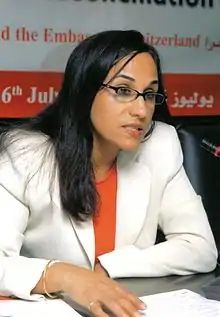Amina Bouayach
Amina Bouayach (born 10 December 1957) is a Moroccan human rights activist. Since December 2018, Bouayach has served as the president of the Moroccan National Human Rights Council.[1]

She first came to notice when, in 2006, she became the first woman elected as president of a major NGO in Morocco.[2]
As president of the Moroccan Organization for Human Rights, Bouayach worked on major Human Rights issues in her native country such as Torture, Refugees' and Migrants' Rights, Women's Rights, Individual Rights and the Abolition of the Death penalty.
She was elected vice-president then secretary general of the International Federation for Human Rights in 2010 and 2013 respectively.[3] Then, in 2016, Bouayach served as the Moroccan Ambassador to Sweden and Latvia.[4]
In 2015, she was awarded the French Legion of Honour in Rabat for her integrity and constant involvement for Human Rights.[3]
During the Arab Spring Amina advocated the abolition of death penalty when she was in Tunisia and Libya. [5]
Background
Bouayach was born in Tetouan on 10 December 1957[2] in a well-known Riffian family, driven out of the Rif by the occupation. Her father, Hammadi Bouayach, was a lawyer, a political activist, a thinker and a Law professor at the University of Rabat, of which he became dean. He was one of the very few selected to be part of a mission to study abroad in Cairo and Paris by Mekki Nassiri. Her grandfather was considered Abdelkrim el-Khattabi's right hand and most loyal general during the Rif War.
She has a master's degree in economics from Mohammed V University in Rabat.
Bouayach began her Human Rights career at a young age, working with the families of political prisoners during the Years of Lead in Morocco. She spent two years working with notorious sociologist Fatema Mernissi on Women's Rights, especially Muslim Women; and has published numerous articles on the subject in Arabic, French, English and Spanish.
Professionally, she has held many political positions, most notably as a member in the cabinet of former Prime minister Abderrahmane Youssoufi from 1998 to 2002, and as a member of the Consultative Commission on Constitutional Reform[2] appointed by King Mohammed VI, in the midst of the Arab Spring. For her notable contributions to the moroccan Constitution, she was awarded the Order of the Throne by King Mohammed VI.
She has worked closely with the United Nations, the African Union and the Euro-Mediterranean Forum on defender's rights, and freedom of association.
She was one of the first human rights figures to visit Tunisia after the abdication of former Tunisian president Zine El Abidine Ben Ali, and to Libya after the disappearance of former Libyan president Muammar Gaddafi. She was and remains very active in the regional group for the reform of the Arab States League.
Amina Bouayach was a member of the Arab Organization for Human Rights and the group of experts in strategic studies in the region of the Office of the United Nations High Commissioner for Human Rights.[6]
In 2014, she held the position of principal coordinator of African NGOs during the African Summit in Addis Ababa.
On October 13, 2016, she became Ambassador of Morocco to Sweden [7] and Latvia. [8]
On December 6, 2018, Amina Bouayach was appointed by King Mohammed VI of Morocco as president of the National Council for Human Rights in Morocco.[9]
For World Women's Day of the Year 2019, she launched a successful national campaign for the abolition of underage marriage in Morocco. [10]
Distinctions
- Amina Bouayach was the first woman to be elected to head a human rights NGO in Morocco. [11]
- She was also elected vice-president and then secretary general of the International Federation for Human Rights [archive] in 2010 and 2013. [12]
- In 2011 and then in 2013, King Mohammed VI awarded her the distinction of Commander of the Order of the Throne and then of Officer of the Order of the Throne.
- In 2014, Amina Bouayach received the insignia of the Knight of the National Order of the Legion of Honor of the French Republic in recognition for her work in favor of the protection and promotion of human rights.[13]
References
- King Mohammed VI appoints Amina Bouayach chairwoman of CNDH, Yabiladi.com, Retrieved 23 March 2019.
- Biography, FIDH.org, Retrieved 17 March 2016
- Morocco's Amina Bouayach awarded Legion of Honour, Morocco World News, Retrieved 17 March 2016
- National Human Rights Council Biography, CNDH.org, Retrieved 21 March 2019
- Amina Bouayach on Business and Human Rights in Morocco
- Amina Bouayach on Business and Human Rights in Morocco
- King of Sweden receives Amine Bouayach
- The Political Director of the Foreign Ministry welcomes a farewell visit from the Ambassador of Morocco
- Qui est Amina Bouayach, nouvelle présidente du CNDH ?
- Mariage des mineurs: Amina Bouayach plaide pour l’abolition de "l’exception"
- Amina Bouayach
- Human Rights Activist Amina Bouayach at the Helm of CNDH, Chaouki Benayoub, Interministerial Delegate for Human Rights
- H24info (2014-12-09). "La Légion d'honneur française décernée à Amina Bouayach et Amina Lotfi". H24info (in French). Retrieved 2018-12-07.
External links
- Amina Bouayach, OpenDemocracy.net
- Uniting activists’ forces is Amina Bouayach’s obsession
- Human Rights Activist Amina Bouayach at the Helm of CNDH, Chaouki Benayoub, Interministerial Delegate for Human Rights
- King Mohammed VI appoints Amina Bouayach chairwoman of CNDH
- HM KING MOHAMMED VI APPOINTS MS AMINA BOUAYACH NEW PRESIDENT OF THE NATIONAL HUMAN RIGHTS COUNCIL
- King Of Sweden Receives Amina Bouayach At End Of Her Mission As Moroccan Ambasador In Stockholm